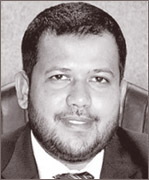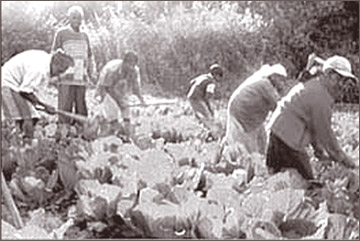Self-reliance and development

 |
|
Minister
Rishad Bathiudeen |
In 1945 Mao Zedong wrote: 'On what basis should our policy rest? It
should rest on our own strength, and that means regeneration through
one's own efforts.' Self-reliance, defined thus, has been the
cornerstone of China's development policy since then.
This might not be apparent, superficially - China's greater
integration with the world economy and consequently its apparent
subjugation to international market forces is seen as a bar to its
ability to retain the initiative in developing itself. However, the
country's self-reliant policy is most clearly apparent in its drive for
technological renewal, which is governed by its nationalist strategy,
rather than by market pragmatism.
The results of this strategy have been to ensure China's sovereignty
and independence, in addition to growing prosperity. At the other end of
the spectrum is Tanzania, once at the forefront of the Third World
self-reliance movement.
Post independence Tanzanian leader Julius Nyerere had formulated a
policy of 'Ujamaa' for the development of his country, which was based
on the institutionalisation of social, economic and political equality,
the abolition of discrimination, the village-isation of production, free
and compulsory education, the creation of a Tanzanian identity and the
fostering of cultural and economic self-reliance.
Foreign aid
A few years before his death Nyerere asked the new Tanzanian
leadership: 'I can understand your decision to do away with the policy
of Ujamaa... but what about the policy of self-reliance? Are you also
not interested in it?'
Unfortunately, Nyerere's advice was not heeded and Tanzania went down
a path of dependent development. Despite substantial mineral and natural
gas production, the country remains poor and is increasingly dependent
on foreign aid.
Tanzanian journalist Attilio Tagalile pointed out this week that
'Since Tanzania elected to become a donor-dependent nation, with almost
30 percent of its budget being funded by the Britton Woods institutions
and other donor countries, the country lost its sovereignty on budget
preparations. Therefore, every year before tabling its official budget
in Parliament, the Minister for Finance is forced to submit the budget
draft to the WB and IMF, on behalf of Tanzania's donors (conveniently
referred to as development partners) for approval.'
Economic growth
Sri Lanka was previously on the same road as that taken by Tanzania,
to dependency and neo-colonialism. However, the Mahinda Rajapaksa
government set its sights on self-reliant development. The focus was on
fulfilling the baseline requirements of the people, to have a healthy
and prosperous population. This was to be achieved mainly through the
village or the neighbourhood - each of which was to be a micro-centre of
economic growth, while preserving its traditional social cohesion - and
the individual household unit. The first step was to promote food
self-sufficiency. The government found that 42 percent incomes were
spent on food and drink.
 |
|
Growing
vegetables |
Furthermore, food consumption patterns were shifting, particularly in
urban households, towards pre-cooked foods; the consumption of fresh
vegetables and food was falling and nutritional value of the food
consumed was descending accordingly. Hence, the Divi Neguma programme
was launched to establish one million self-sufficient domestic economic
units - the majority growing food items in home gardens using organic
fertiliser, while earning stable incomes from surplus produce. One
hundred households were selected from each Grama Niladhari (Village
Officer) division and given seed, organic fertiliser, advice and other
aid.
One year on, this programme had the effect of reducing drastically
the price of vegetables and fruit, while ensuring a better nutritive
balance in (especially urban) diets. Apart from the cultivation of
vegetables and fruit, the Divi Neguma programme envisages that
households will undertake projects in other horticulture, bee keeping,
animal husbandry, fisheries and cottage industry. Under the third phase
of the programme, 2.5 million household units are to be included.
After food security, an important plank of self-reliant development
is the preservation of a substantial manufacturing and industrial sector
supplying domestic needs. Unfortunately, Sri Lanka's economic growth has
hitherto rested mainly on a service sector which has depended for profit
on the consumption of imported goods - rather than on the productive
sectors.
Free trade agreements
As the Divi Neguma programme lowers expenditure on food items, the
amount available for other expenditure will increase, creating a larger
market for imported goods. It is necessary to divert as much of the
resulting consumption towards locally produced goods. This can be
achieved mainly through fiscal and tariff methods - which, unfortunately
are constrained by Sri Lanka's commitments to the World Trade
Organization and to several multilateral and bilateral free trade
agreements.
Nevertheless, the government has pursued several options in this area
since 2005, affording some level of protection for local industries and
jobs for the first time since the introduction of the open market
economy. This has caused chagrin in Globalisation circles - which see
the world in terms of capital, markets and cheap labour, not as
populations who require fulfilment of necessities and social cohesion.
There are certain specific areas which the government is targeting.
For example, this month Industry and Commerce Minister Rishad Bathiudeen
said that the President intends to promote domestic import substitution
production of pharmaceutical products in order to reduce the heavy
dependence on imports.
This is likely to benefit the local population, as the product
quality is likely to improve.
The government is also focussing on energy self-sufficiency. The
current heavy dependence on imported fossil fuels is unhealthy.
Increased attention is being given to renewables, which do not require
imported fuels.
In following this path, it is necessary for Sri Lankans to bear in
mind another of Mao's sayings:
'We must recognize difficulties, analyse them and combat them. There
are no straight roads in the world; we must be prepared to follow a road
that twists and turns and not try to get things on the cheap.'
It was a similar attitude which saw the country through the horrors
of the conflict of the past years and it can see the country through the
ongoing battle for self-reliant development.
|



